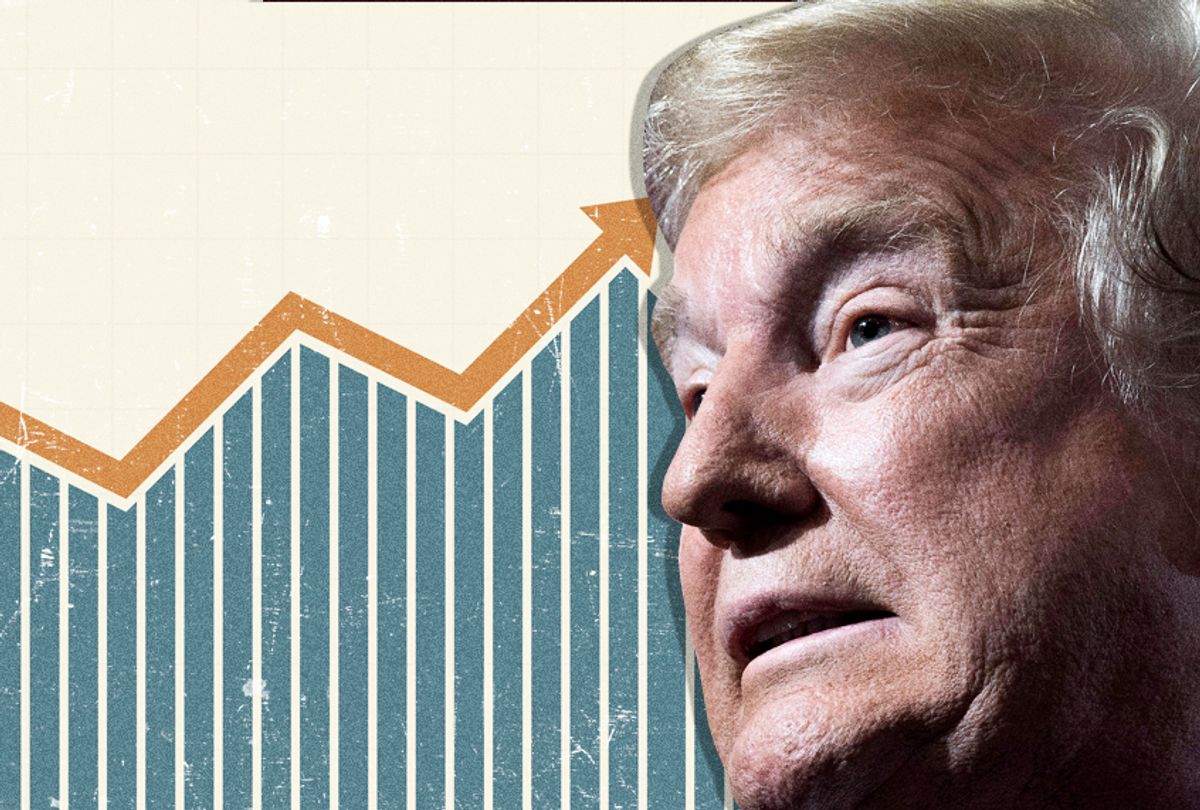The disconnect between the corporate news media’s reporting about the “great American economy” and the actual circumstances of the American people grows by the day. It just underscores what great lengths vulture capitalists will go to keep a status quo in place that further enriches themselves at the expense of the health of the nation and the planet itself.
It should tell you all you need to know about our surreal tipping point when an orange obese POTUS, who loves McDonald's, proclaims our economy is the “envy of the world” because our Gross Domestic Product grew by 4.1 percent in the second quarter of 2018.
READ MORE: Your Job can make you a bad parent
For the powers that be it is very important that the narrative remain that America is in the midst of a recovery that’s delivering for the majority of Americans. That’s the only way to head off something really radical born out of decades of income stagnation experienced by tens of millions of Americans who have been squeezed out of the middle class even as wealth concentration accelerated at the very top.
And so the boosters of the "dynamic American economy" narrative also point to the historically low unemployment rate as a sign that Trump’s “policies”, including a $1.5 trillion tax cut, that was skewed to corporations, is generating a broad-based prosperity.
“Because it was that particular tax cut that gave the boost to GDP growth, that boost is accompanied by a sharp worsening of income and wealth inequality,”Richard Wolff, an economics professor at New School University, said in an email. “And that effect is far more important to everyday people than the GDP growth number (largely an abstraction).
READ MORE: the id of Trump the economics of place and our empty national soul
He continued, “Here is the key mechanism: corporations have been shown to be using the funds saved from taxes by the Dec 2017 law largely to buy back their companies' shares in the stock market. That boosts the market values which disproportionately benefits (1) the top 10 percent of shareholders, who own 84 percent of the shares, and (2) the top corporate executives, whose pay and benefits are often tied to stock prices. Nothing comparable has boosted average wages which indeed continue to stagnate as they have over the last 40 years. The rich get richer and the rest get nothing.”
Day in and day out the population is barraged by the tick-tock of the stock market indexes and commodity prices. No doubt, the lottery numbers are relevant to more Americans than the Wall Street close.
And so America remains a part-time nation where the average work week, according to the Bureau of Labor Statistics, is 34.5 hours. Meanwhile, MarketWatch reported earlier this year that only 39 percent of Americans said they had sufficient resources to a pay for a $1,000 Emergency Room visit, with 44 percent admitting that they could not cover a similar $400 surprise expenditure.
It is important to keep in mind that close to 100 million Americans are not in the workforce, with 44.5 million retirees, 14.5 million in school, 12.8 million caring for a loved one, and 15.3 million not working because they are sick or disabled, and of course the 2.3 million incarcerated Americans.
So, where did this word "economy" come from and what does it describe? A quick reference check shows it derives from the Latin work oeconomia, translated to mean household management.
We can’t make the changes the nation needs desperately working in the same frameworks that got us here. The corporate news media keeps reporting on the American economy the same way it did before the Great Wall Street Bank Heist when $20 trillion of American household wealth was stolen to the advantage of the same Wall Street institutions that own our politics today.
Rather than fixate on the aggregate emptiness reflected in the GDP we need to zero in on what matters right now in terms of actual national well-being, household by household. As it turns out, there are real consequences of letting so many Americans fall behind while the nation’s wealth is increasingly concentrated in fewer and fewer hands. We have already seen it in back-to-back annual declines in Americans’ life expectancy.
As Jeffrey Sachs, an economist at Columbia University, recently wrote, our country is in the throes of three “interrelated epidemic diseases, notably obesity, substance abuse (especially opioid addiction) and depression.”
In his chapter on America in the "The World Happiness Survey 2018," Sachs writes “Indeed, while America’s income per capita has increased markedly during the past half-century, several of the determinants of well-being have been in decline.” He traces the corporate linkages between obesity and addiction to America’s fast-food and pharmaceutical industries, who, through their extensive lobbying, fight regulation and accountability.
“First, the U.S. sociopolitical system produces higher levels of income inequality than in other OCED [Organisation for Economic Co-operation and Development] high-income countries,” writes Sachs. “High U.S. inequality, and especially the persistent absolute relative poverty of a significant portion of the U.S. population, are risk factors for all three epidemics.”
That’s the real Gross Domestic Product we need to zero in on.



Shares